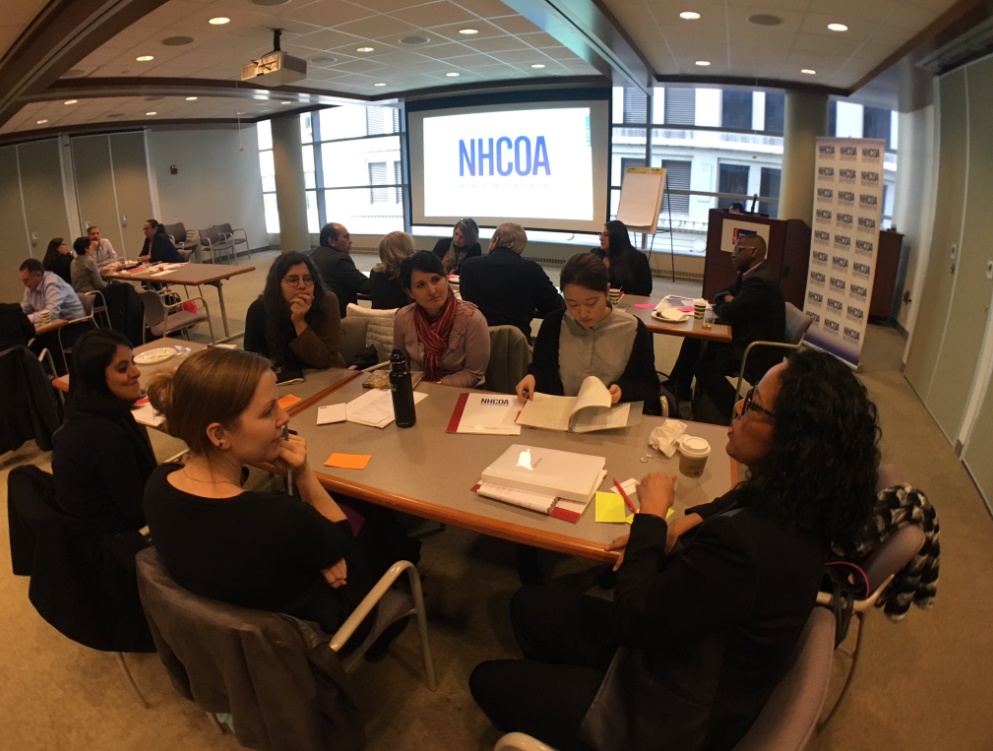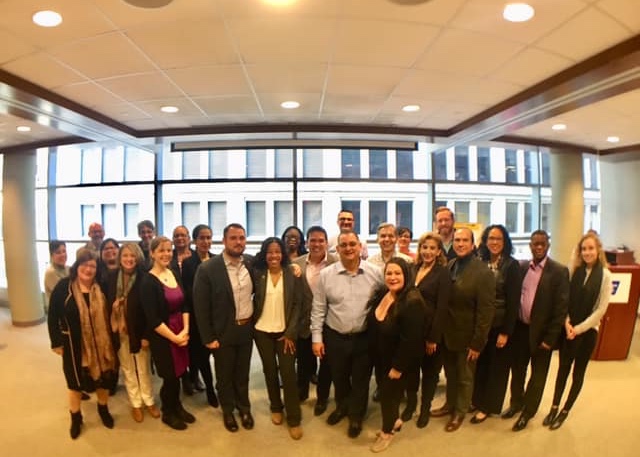“Aging should not take away our identity.”

This reflection was just one of the many ideas that came out of the 3rd edition of the Reframing Aging Thought Leaders Roundtable, organized by the National Hispanic Council on Aging (NHCOA) held in New York City on October 19, 2018. A group of 27 experts in the field of aging gathered once again to address the misconceptions around getting “older”. This meeting was a continuation of conversations that began at roundtables in Washington, DC and Albuquerque, NM.
Anna Maria Chavez, Executive Vice President of the National Council on Aging was one of the thought leaders in attendance. In her opinion, the mobilization of people to change the negative perception of older adults in the U.S., should be the main purpose of this initiative.
“I am passionate about giving people the right to age well; we can maximize the opportunities, address the challenges, and ensure that every person has what they need to age well. Aging should not take away our identity. It is about all of us, not just today’s older adults. None of us can change the story of aging alone. Partnerships are critical.” She added, “The swamp of public opinion is real. Understanding the swirl of misinformation out there is critical to showing us what to say and—just as importantly—what NOT to say,” said Chavez.
One of the questions that garnered attention during the discussion was the best way to use the intergenerational link to create a public health campaign to address barriers of healthy aging. According to Jason Resendez, Executive Director of Latinos Against Alzheimer’s, a network of Us Against Alzheimer’s, of the 10 million millennial caregivers in the US, one sixth are caring for someone living with Alzheimer’s or another form of dementia.
“We believe that in order to successfully reframe aging we have to address the barriers to healthy aging, and one of the biggest that our society faces is the growing impact of Alzheimer’s and other dementias in our communities. We found that 30% of the millennials who are caregivers to those with dementia are Latinos, and for this reason, it is very important to include the support of millennials, as well as their training to become caregivers,” highlighted Resendez.
Aging well is closely related to health equity and clinical research participation. Latinos represent less than 5 percent of clinical research participants. They face barriers to participation such as language and cultural differences.

For Dr. Elizabeth Gross Cohn on behalf of All of Us Research Program it is necessary to think more about how we can design studies that work in the real word. “We need everyone; we need all kinds of people, from rural areas, urban areas, from different ethnic, racial, and economic backgrounds, different education levels, and different ages, but also, we need more people over the age of 65 because research tests systemically exclude them. A lot of time researchers say; we don’t want to take people 65 or older, we don’t want to take people with more than two medical conditions. Unfortunately it doesn’t help the majority in the communities of older adults.”
Elder abuse was an important issue addressed during the roundtable. For Hilary Dalin, Director of the Office of Elder Justice and Adult Protective Services at the Administration for Community Living, to reframe this reality it is important to get the support and participation of everyone. “Words have meaning and those meanings drive actions. We have to attend to the words that we use, and we have to make sure that those words are connecting with actions that we all need to take to emphasize the value of social justice.”
The Reframing Aging Thought Leaders Roundtable is an initiative of the National Hispanic Council on Aging and it is based on studies and research conducted by the FrameWorks Institute, which has highlighted how messages such as “fighting aging” or “staying young” increase ageist attitudes. “The number one predictor of how people will think about something is how many times they hear it. Reframing Aging will be a group effort. All of us have to change the way we talk about aging if we want to end ageism,” said sociolinguist Julie Sweetland, Vice President for Strategy and Innovation at the FrameWorks Institute.
“What you do after 50, can be just as amazing as what you’ve done before 30.” This is the slogan of Disrupt Aging, a campaign leaded by AARP, which is an effort to have a new conversation “often funny, sometimes raw, and always honest” about how people want to live and age. Reggie Nance, Associate State Director for Multicultural Engagement for AARP New York was present at the Reframing Aging Thought Leaders Roundtable, featuring this initiative.
We need to continue advocating for policies, from public and private sector, to guarantee working spaces for older adults because they can still be productive, and to pursue this goal we need to highlight the collective benefits for both the worker and employer. It is common to associate family leave with people who are under 40, assuming that older adults have already retired. However, more than 30% of this group remains in the labor market. For all of them, the passage and implementation of the paid leave initiatives at the national level is a priority. Madeleine Villanueva and Eric Williams from the New York Paid Leave Coalition were two of the thought leaders present and shared the status of the Paid Family Leave legislation and its importance to aging well.
Dr. Anderson Torres, President and CEO of RAIN, Inc., and on behalf of NHCOA led this edition of the ReframingAging Thought Leaders Roundtable. “I want to thank NHCOA for giving me the opportunity to lead this conversation. Today, we have the responsibility to build a bridge to connect Older Adult populations with a society more equal, inclusive, and with affordable opportunities.
The Reframing Aging Thought Leaders Roundtable was sponsored by the John A. Hartford Foundation, All of Us, and NCOA.
The opinions expressed in this article are those of the author and do not necessarily reflect those of the Diverse Elders Coalition.
